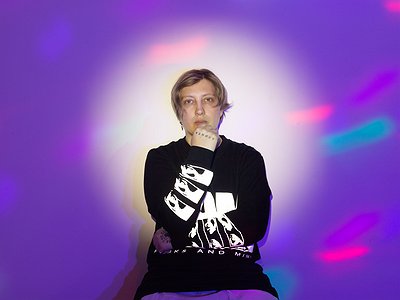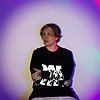Part 1
Name: Alinka Ratner
Nationality: Ukrainian
Occupation: DJ, producer
Current Release: Alinka's Universal Motion EP is out now on Rekids.
Recommendations: I’m currently reading ‘Notes On A Nervous Planet’ by Matt Haig, and can recommend this book. An album that I never get sick of is Massive Attack ‘Mezzanine’, I learned to hear music in a totally different way after listening to this album.
If you enjoyed this interview with Alinka, head over to a few of the spots where she presents her music and thought on the web: Facebook, Instagram and her bio page at The Hemisphere Agency. She also runs a label of her own, Fantasy Life, where she releases her own music.
When did you start DJing - and what or who were your early passions and influences? What was it about music and/or sound that drew you to it?
I started DJing in the summer of the year 2000. I had been collecting records and practising at friends houses for a few months prior, but I got my first turntables and mixer at the end of that summer after working double shifts as a lifeguard all summer to save money. Chicago was my biggest influence musically. I was fortunate to grow up around my musical heroes and my favourite DJs.
What drew me to this music was how fresh and inspiring it was. The whole club/rave scene was new to me at the time, I had heard house music on the radio all throughout my childhood, but didn’t know what I was listening to until I started to dive deeper into it when I went away to University. It wasn’t like anything I ever experienced before, and it opened up a whole new world to me that I immediately fell in love with and wanted to explore.
For most artists, originality is preceded by a phase of learning and, often, emulating others. What was this like for you: How would you describe your own development as an artist and the transition towards your own voice?
I think originality is something you have or don’t have inside you, you can’t really teach that. The technical part of production you can learn, but you can be the best producer technically and still never sound like yourself.
When I started producing around 2002, there weren't endless YouTube tutorials or online resources. I wanted to teach myself everything so it took many years of trial and error to get to the point where I could sit down and really start to express myself and get my ideas out. It took probably 10 years for me to even like anything I made, but I kept trying. When it finally clicked it just kept going. I’m still always learning and growing, that’s my favourite part of it, the constant surprises.
I think it’s also important as an artist to be able to see your growth and development. I’m happy to listen to my early records where I had no idea what I was doing and still hear myself in them and what I was trying to achieve. I’m not the best producer technically, there are a lot of producers who are much better technically than I am. But I sound like myself which makes me irreplaceable.
That’s always been my goal: to be able to express my own ideas fully. When you get to that point the possibilities are endless.
How do you feel your sense of identity influences your creativity?
I think finding your own voice comes from growing as a person and then as an artist, for me they’ve always been connected. I had to find myself in life to gain the confidence as an artist before I could really express myself musically the way I wanted to.
For me creativity comes from letting go and feeling free. Part of not giving a fuck and finding that freedom comes from finding yourself and having the confidence to be yourself fully without question.
What were your main creative challenges when starting out as a DJ and how have they changed over time?
I didn’t really have creative challenges starting out as a DJ. I came up in Chicago where the DJs don’t fuck around, and you have to really prove yourself to get respect. I practised day and night when I got my first decks and I got my first club gig a few months after that. I remember that gig well. I mixed in New Order ‘Blue Monday’ with Kevin Irving ‘House Ain’t Giving Up’, that was my first perfect blend, and then I knew I would never be happy doing anything else with my life and just kept going after that.
There was a period, though, around 2008 where I ended up quitting DJing for a few years. I just really felt burned out and uninspired. I wasn’t in love with the music coming out at that time, and I was kind of at a turning point where I felt a lot of pressure to figure my life out since I couldn’t support myself from music. Those were very difficult years for me, but I’m grateful for that part of the journey.
My friend introduced me to the music of Hercules & Love Affair and I used to sit at my day job and watch their videos on YouTube and got inspired to start making music again. I had a live project with a friend around 2012 which lead me to meet Shaun J. Wright and start making House music again. I fell in love with the music all over again and with DJing, and had a second chance in life.
As creative goals and technical abilities change, so does the need for different tools of expression, be it instruments, software tools or recording equipment. Can you describe this path for you, starting from your first studio/first instrument? What motivated some of the choices you made in terms of instruments/tools/equipment over the years?
I started out messing around with a shitty PC laptop, a copy of Reason my friend gave me, and a midi keyboard. Then a year later I saved up and bought my first Mac and Logic 6. I’ve used Logic ever since.
My motivation was always the same, finding the right instruments to get my ideas out the easiest and fastest. I’m not a super technical person, I don’t like to sit around for hours trying to find a sound or figure out how a piece of gear works. So I am drawn to instruments that let me express myself from the moment I sit down in the studio. I have had a variety of gear through out the years to get to the point where I’m really comfortable and happy. Now I mostly use a Moog Sub 37, Korg Prologue, NI Maschine, and Logic and a variety of plugins and smaller synths. I’m very much in love with synths though, so when I have more space and money I’m sure I’ll keep adding them to my collection.
That said, I am a firm believer that it’s not about the gear, it’s about the ideas. You can create something magical with very little and something really shit with all the gear in the world. It’s really about the person behind the gear in the end that makes it special.
Have there been technologies or instruments which have profoundly changed or even questioned the way you perform?
As a DJ of course CDJs changed our industry, and there’s positive and negative aspects for me personally. I love playing records. I have a very active and anxious mind and playing records and making music is just about the only time I have complete peace and stillness. I don’t get that as much playing with CDJs, but they have allowed me to be more creative in different ways which opened up new possibilities. Having so much music on a USB stick allowed me to really explore more as a DJ. I like a lot of different genres so it’s really nice to be able to access more music easily on the spot. In the end I just love playing music and that’s what it’s all about for me, the medium is secondary.
DJing is a unique discipline at the border between presenting great music and creating something new with it, between composition and improvisation. How would you describe your approach to it? What do you start with, how do you develop a set, how does a form gradually manifest itself, what are good transitions between different tracks etc …
When I started mixing I fell in love with the ability to create something new on the fly with two records. I loved that feeling of improvisation more than anything, and that was my focus. As I developed more it became more about creating an energy in the room. I always liked to stand in the back of the booth in the clubs. It wasn't to watch the DJ, but to watch how the crowd reacts to different tracks and remember that feeling. I did this a lot when I was learning to DJ, and would go home and practise afterwards. I was also fortunate to be an opening DJ for years and learn how to take a room from empty to full on a journey. I think it’s really about learning to read the room and having a real connection to the music you’re playing. I only play stuff I would want to dance to.
I don’t ever plan sets but I make folders with different genres and go from there. I like a lot of different music, and I like to challenge myself and not be put in a box. Berlin opened me up a lot creatively because people are so open and up for anything here, it made me grow a lot as a DJ. My goal is always to create these magical moments, we never forget them.






